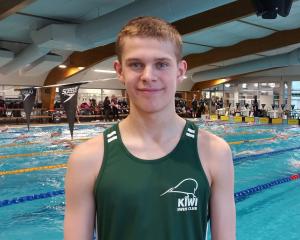There is no doubt he has done the training and all the hard work to be the best prepared to block out the hurt and torment he will put his body through over the Olympic distance triathlon involving a 1500m swim, 40km bike and 10km run.
Creasy said it was time to go out an put it on the line.
Coming second in his highly competitive age group (men 30-34), was not an option he wanted to contemplate.
Creasy (31), recently gained praise for his come-from-behind victory in the men's 30-34 age group at last month's national duathlon championships in Taupo.
"It was just one of those things you do at the time," Creasy said of stopping mid-way through the first running stage to administer assistance to a female competitor who had collapsed.
"If I'd carried on, I wouldn't have been able to live with myself had anything happened."
Creasy stopped mid-stride and rushed to give help, rolling the woman over who appeared to have stopped breathing.
"Thankfully once I rolled her over she gave a huge gasp and started breathing again.
"I then put her in the recovery position and stayed with her until help arrived."
He caught up through speed on the bike and managed to hang on with a tough last 1500m run.
When a youthful Creasy first came to Dunedin to attend the University of Otago in 1999, anything multisport was the furthest thing from his mind, as he was solely focused on a promising rowing career, where he represented Otago and New Zealand university teams, mostly crewing in lightweight fours and eights.
But getting a job in Christchurch he evolved into multisport after meeting Roly Crichton, coach of Paralympic gold medalist Sophie Pascoe.
Crichton unlocked Creasy's ability to perform well over the three multisport disciplines.
Also aiding the multisport bug was being a member of brother Warwick's support crew in the Coast to Coast.
Creasy had his first taste of national triathlon competition early in 2005, finishing a respectable third in the 25-29 age-group.
"I thought, this is good. But I've learnt a lot of big lessons along the way since."
He was then introduced to John Hellemans, who was coaching a group of triathletes including Andrea Hewitt and Chris Gemmell.
Hellemans began working with Creasy at the University of Canterbury and tapping into his knowledge of sports science and using it to prepare athletes for the Beijing Olympic Games.
Since Creasy began competing in triathlon in 2004, the past eight years have been more of an evolution for him, as opposed to working closely with elite athletes.
His first world championships were in Hawaii in 2005, followed by Switzerland in 2006. Although he finished midfield on both occasions, he took the results as a learning curve for future competition.
His work with Hellemans, Hewitt and Gemmell in Beijing led into working for Triathlon New Zealand as a sports physiologist.
"Basically it's about figuring out ways on how to go faster than everyone else in the world," he said of his role with Triathlon New Zealand.
Gaining a Prime Minister's Scholarship to study for a PhD, Creasy returned to Dunedin to study.
He admitted at this time he was really struggling for direction.
"There comes a point when your dreams start getting the better of you.
"I've always wanted to do a PhD and always wanted to work with top level athletes.
To work with John [Hellemans] had been a dream.
"To get the opportunity was fantastic."
He flirted with racing professionally two years ago but quickly realised the commitment needed to continue down the professional track, and decided to stick with his PhD and working for Triathlon New Zealand.
He looked at what the top athletes were doing and how best he could use it.
One was applying Lydiard principles to what Hellemans was doing and there was improvement within six months.
"I tried to cut so many corners in the past. But at the end of the day nothing beats hard work.
"Hard work and being smart about the way you do things is the key," he said.
"That's not just with training. It's with work. It's with life."
Creasy took these principles to new levels and began contesting ironman, culminating in finishing the famous Hawaii event in 9hr 17min.
Last July, he won the 30-34 age group title at the World Triathlon Long Distance Championships in Spain.
Another goal he achieved was breaking 9hr for the ironman, recording 8hr 52min in Melbourne.
But next week is a major focus.
"The world's next week are definitely unfinished business for me. It's been a goal for quite a while.
"The silver I got in 2009 should have been gold. I was winning the race and got passed with 3km to go.
"I've thought about it a lot. Now with work and study, I may not get another opportunity."












